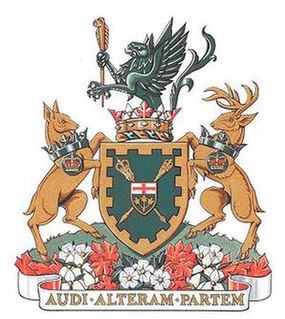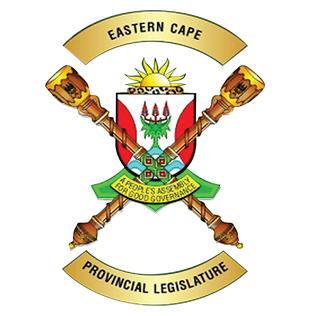
The premier of British Columbia is the first minister, head of government, and de facto chief executive for the Canadian province of British Columbia. Until the early 1970s the title prime minister of British Columbia was often used. The word premier is derived from the French word of the same spelling, meaning "first"; and ultimately from the Latin word primarius, meaning "primary".

The New Brunswick Liberal Association, more popularly known as the New Brunswick Liberal Party or Liberal Party of New Brunswick, is one of the two major provincial political parties in New Brunswick, Canada. The party descended from both the Confederation Party and the Anti-Confederation Party whose members split into left-wing and right-wing groups following the creation of Canada as a nation in 1867.

The Premier of Saskatchewan is the first minister for the Canadian province of Saskatchewan. They are the province's head of government and de facto chief executive. The current Premier of Saskatchewan is Scott Moe, who was sworn in as premier on February 2, 2018 after winning the 2018 Saskatchewan Party leadership election. The first Premier of Saskatchewan was Thomas Walter Scott, who served from 1905 to 1916. Since Saskatchewan joined Confederation as a province in 1905, 15 individuals have served as premier.

The Progressive Conservative Party of Newfoundland and Labrador is a centre-right provincial political party in Newfoundland and Labrador, Canada. The party was founded in 1949 and most recently formed the Government of Newfoundland and Labrador from the 2003 general election until the 2015 general election. The party has served as the official opposition to the government of Newfoundland and Labrador since December 14, 2015. On April 28, 2018 St. John's lawyer Ches Crosbie was elected leader.
In Canada, a premier is the head of government of a province or territory. Though the word is merely a synonym for prime minister, it is employed for provincial prime ministers to differentiate them from the Prime Minister of Canada. There are currently ten provincial premiers and three territorial premiers. These persons are styled The Honourable only while in office, unless they are admitted to the Queen's Privy Council for Canada, in which case they retain the title even after leaving the premiership.

The Legislative Assembly of Ontario is the deliberative assembly of the Legislature of Ontario. The Assembly meets at the Ontario Legislative Building at Queen's Park in the provincial capital of Toronto. Bills passed by the assembly are given royal assent by the Queen of Canada, represented by the Lieutenant Governor of Ontario.
The provincial secretary was a senior position in the executive councils of British North America's colonial governments, and was retained by the Canadian provincial governments for at least a century after Canadian Confederation was proclaimed in 1867. The position has been abolished in almost all provinces in recent decades ; the exceptions are Saskatchewan and Nova Scotia, where it still exists but is no longer a senior portfolio.
The Minister of Finance is a cabinet minister in the government of Manitoba. Prior to 1969, the minister was styled as the Provincial Treasurer. Many regard the Finance Minister as the second-most important member of government, after the Premier.
Ronald Gordon "Ron" Stevens, Q.C. was a Canadian politician. He was a member of the current Legislative Assembly of Alberta representing the constituency of Calgary-Glenmore as a Progressive Conservative until his resignation on May 15, 2009. He was subsequently appointed a Judge of the Court of Queen's Bench of Alberta on May 20, 2009 by the government of Canada.

The Government of Ontario, formally Her Majesty's Government of Ontario, is the provincial government of the province of Ontario, Canada. Its powers and structure are set out in the Constitution Act, 1867.
The Premier of the Northern Cape is the head of government of the Northern Cape province of South Africa. The current Premier of the Northern Cape is Zamani Saul, a member of the African National Congress, who was elected in the 2019 election. He took office on 22 May 2019.

The Government of Khyber Pakhtunkhwa is the provincial government of the province of Khyber Pakhtunkhwa, Pakistan. Its powers and structure are set out in the provisions of the 1973 Constitution, in which 32 districts come under its authority and jurisdiction. The government includes the cabinet, selected from members the Khyber Pakhtunkhwa Assembly, and the non-political civil staff within each department. The province is governed by a unicameral legislature with the head of government known as the Chief Minister. The Chief Minister, invariably the leader of a political party represented in the Assembly, selects members of the Cabinet. The Chief Minister and Cabinet are thus responsible the functioning of government and are entitled to remain in office so long as it maintains the confidence of the elected Assembly. The head of state of the province is known as the Governor, while the administrative boss of the province is Chief Secretary Khyber Pakhtunkhwa.
Thomas Wendell "Tom" Marshall, QC, MHA is a Canadian lawyer and politician. He was the 11th Premier of Newfoundland and Labrador, having served in this capacity from January 24, 2014 to September 26, 2014.

The Government of New Brunswick refers to the provincial government of the province of New Brunswick. Its powers and structure are set out in the Constitution Act, 1867.
The Government of Quebec refers to the provincial government of the province of Quebec. Its powers and structure are set out in the Constitution Act, 1867.

The nine provinces of South Africa are governed by provincial governments which form the second layer of government, between the national government and the municipalities. The provincial governments are established, and their structure defined, by Chapter Six of the Constitution of South Africa.
Like the other eight provinces in South Africa, Northern Cape is governed by a parliamentary system, with the premier of the province selected from the leadership of the largest party or coalition in the provincial legislature. The premier then selects the members of his Executive Council (cabinet) from among his fellow MPL's; they are assigned to the different departments in the government, even though the departments' day-to-day business is run by the Heads of the Department (HOD), who are also appointed by the premier.
David Dabede Mabuza is the Deputy President of South Africa and Deputy President of the African National Congress (ANC). He is also the former Premier of Mpumalanga.

The North West Provincial Legislature is the primary legislative body of the South African province of North West. It is unicameral in its composition, and elects the premier and the provincial cabinet from among the members of the leading party or coalition in the parliament.

Alan Richard Winde is a South African politician and previous businessman. He is currently serving as the 8th Premier of the Western Cape and a Member of the Western Cape Provincial Parliament. He previously served as Western Cape Provincial Minister of Community Safety, Western Cape Provincial Minister of Economic Opportunities and Western Cape Provincial Minister of Finance, Economic Development and Tourism. Winde is a member of the Democratic Alliance (DA).












